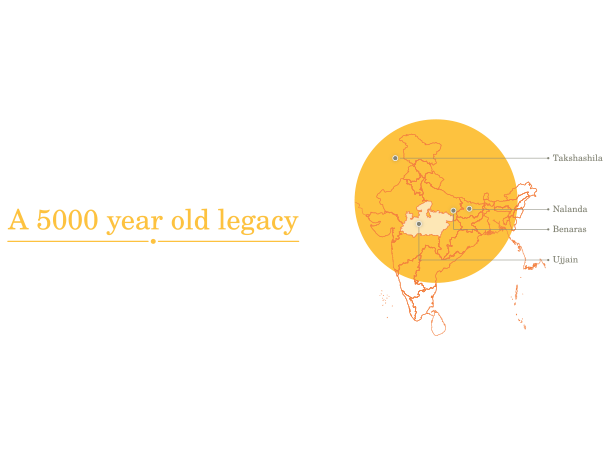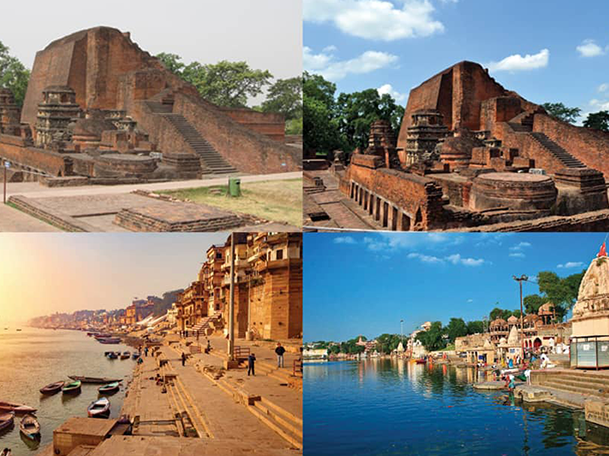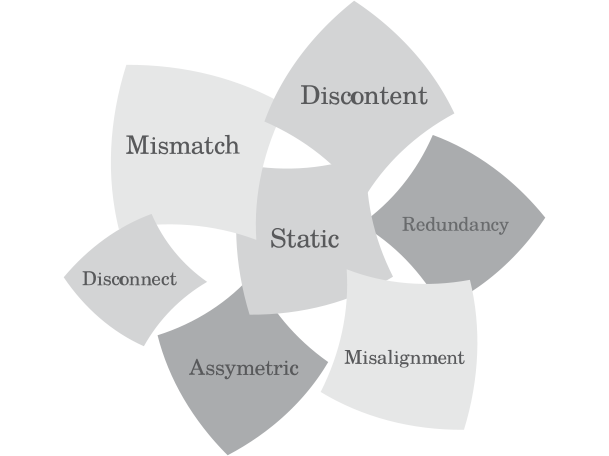Genesis
Our origin is rooted in the onus of reviving the status of Ujjain as a leading center of knowledge, thereby preserving its history and contributing towards the welfare of society.
Edification in Ancient India
"India's Cultural diversity has left an indelible impact on its education system".
India's rich cultural heritage is an immaculate amalgamation of various practices, refined over the course of 5000 years. Education is the core resource to build a stable and prosperous society, as it was perceived in ancient India.The Gurukul way of learning was far remote from civilization so as to allow them to function independently. They were thus instrumental in laying the foundation of Indian culture and its sustenance throughout the ages. Their robust curriculum focused on the all-round development of students, stressing molding their physical, critical, creative, and analytical abilities. Indian history stands as testimony to the fact that our society has embraced and adopted new ideas and cultures — be it a monastery for Buddhist learning, a madrasah for Islamic learning, or a pathshala for Hindu learning. Each one of these learning centers flourished over a period, notwithstanding any social or political conflict.

Learning Centers
Ancient literature, as old as the 6th century BCE, (Before Common Era), mentions the four great power centers as Vatsa, Kosala, Magadha, and Avanti.
The Avanti kingdom with its capital Avantika, later named Ujjaini, is believed to have a history of 5000 years. Located on the banks of river Kshipra, Ujjain played an important role in the education landscape of ancient India as it fostered linguistics, astronomy, astrology, arithmetic, classical arts, and liberal thinking.
Ujjain was fortuitous to have been home to some of the greatest minds of our civilization, which in turn helped substantiate its intellectual aura. Works of the great Sanskrit poet Kalidas – who was a resident of Ujjain - are among the finest examples of classical liberal arts. Legendary figures from the Mahabharata - Sudama, Balram, and Krishna also studied under the Guru’s Guru, Sandipani at his ashram here, where learning and teaching in several disciplines were carried out. Samrat Ashok also completed a major part of his education in Ujjain.
Ujjain has always nurtured collaborative learning between multiple fields of study. The Navratnas from the court of Ujjain’s great emperor, Samrat Vikramaditya, who heralded the golden age of Sanskrit literature, exemplify this.

Need for Reformation
For years now, the Indian education system is calling out for comprehensive reforms. The time has come for us to explore and move ahead towards creating a better future. The need of the hour is to empower young minds that are well-equipped to deal with the present needs and confront unexpected challenges of the future.

Paradigm Shift
"Excellence is not an objective; it is a way of life at Avantika."
The current education system requires a shift that will offset the stagnation brought upon by its redundancy. Avantika envisions creating agents of change by imparting in them a keen sense of social responsibility, analytical thinking, and problem-solving skills. MIT Group of Institutions, Pune has unveiled a unique education model that integrates design and technology disciplines over a strong foundation of liberal education and design thinking principles. The thought behind this endeavor, as conceived and envisioned by Prof. Vishwanath D. Karad is to revive the status of Ujjain as a leading center of knowledge, thereby preserving its history and contributing to the welfare of the society. The university envisages a distinct learning environment where students are empowered to deal with diversity and change to further apply their knowledge and skills to combat real-world challenges. The interdisciplinary, integrative, and immersive approach to learning will help augment the quality of higher education, providing qualitative, relevant, and contemporary education. Avantika will address the current and futuristic need to create holistic individuals. Learners at Avantika will be the harbingers of change, who will look at challenges more comprehensively.

The Identity
The Lotus symbolizes potential and in its fully blossomed form represents enlightenment and awareness. The flower is deeply rooted in Indian culture, particularly associated with Saraswati - the Goddess of Wisdom. The transdisciplinary approach is represented through the confluence of sections, implying an immersive learning experience. The transition of colors represents the evolution of an individual at Avantika University. The identity reflects transformation and it is the knowledge (Vidya) that takes us through this transformation and leads us to accomplishment (Siddhi).
